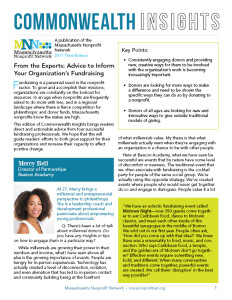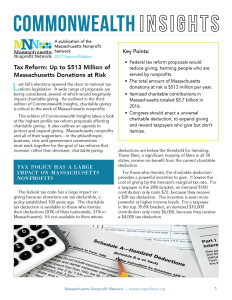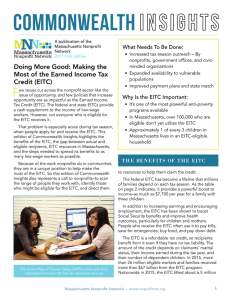MNN’s Commonwealth Insights publications highlight policy, issues, and trends important to the nonprofit sector. In each edition, we’ll feature data and stories that illustrate the full depth and breadth of the nonprofit sector in Massachusetts.
2017 Third Edition:
From the Experts: Advice to Inform Your Organization’s Fundraising
In our third edition of Commonwealth Insights, we interviewed four fundraising experts and collected their advice to aid with nonprofits’ end-of-year fundraising drives.
Key Points include:
- Consistently engaging donors and providing new, creative ways for them to be involved with the organization’s work is becoming increasingly important.
- Donors are looking for more ways to make a difference and need to be shown the specific ways they can do so by donating to a nonprofit.
- Donors of all ages are looking for new and innovative ways to give outside traditional models of giving.
2017 Second Edition:
Tax Reform: Up to $513 Million of Massachusetts Donations at Risk
In our second edition of Commonwealth Insights of 2017, we looked at current federal tax proposals and their impact on giving in Massachusetts.
Key points and recommendations include:
- Federal tax reform proposals would reduce giving, harming people who are served by nonprofits.
- The total amount of Massachusetts donations at risk is $513 million per year.
- Itemized charitable contributions in Massachusetts totaled $5.7 billion in 2016.
- A series of policy recommendations to protect charitable giving, including:
- Preserving the federal charitable tax deduction;
- Enacting a universal charitable tax deduction; and
- Coupling the universal charitable tax deduction with other tax policies, specifically rate cuts and an increase to the standard deduction.
- A call to Congress to keep nonprofits out of politics and preserve the Johnson Amendment.
2017 First Edition:
Doing More Good: Making the Most of the Earned Income Tax Credit (EITC)
In our first edition of Commonwealth Insights of 2017, we looked at one of the most powerful anti-poverty programs available, the Earned Income Tax Credit (EITC) and what Massachusetts nonprofits, government offices, and civic organizations are doing and could be doing more of to close the awareness gap among eligible residents.
Key points and recommendations include:
What Needs To Be Done:
- Increased tax season outreach – By nonprofits, government offices, and civic-minded organizations
- Expanded availability to vulnerable populations
- Improved payment plans and state match
- It’s one of the most powerful anti-poverty programs available
- In Massachusetts, over 100,000 who are eligible don’t yet utilize the EITC
- Approximately 1 of every 3 children in Massachusetts lives in an EITC-eligible household
Released one month ahead of the tax-filing deadline, this report serves as a call to action to nonprofits to use their unique position in communities across the Commonwealth to spread awareness of and access to this important credit.
Click here to view 2016 editions.
The Commonwealth Insights series is made possible by support from the Barr Foundation. 



